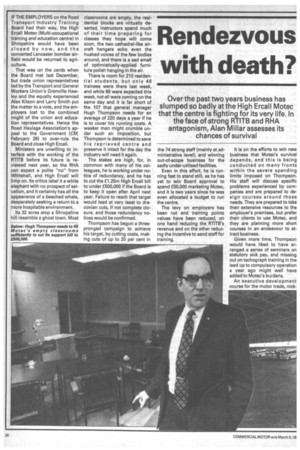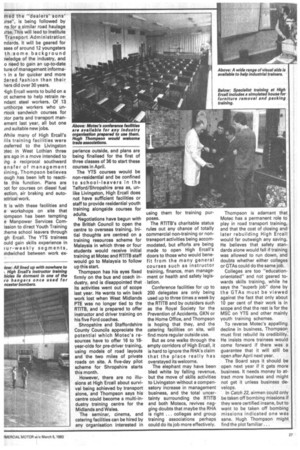Rendezvous with death?
Page 28

Page 29

If you've noticed an error in this article please click here to report it so we can fix it.
Over the past two years business has slumped so badly at the High Ercall Motec that the centre is fighting for its very life. In the face of strong RTITB and RHA antagonism, Alan Millar assesses its chances of survival
IF THE EMPLOYERS on the Road Transport Industry Training Board had their way, the High Ercall Mateo (Multi-occupational training and education centre) in Shropshire would have been closed by now, and the converted Lancaster bomber airfield would be returned to agriculture.
That was on the cards when the Board met last December, but trade union representatives led by the Transport and General Workers Union's Grenville Hawley and the equally experienced Alex Kitson and Larry Smith put the matter to a vote, and the employers lost to the combined might of the union and education representatives. Hance the Road Haulage Association's appeal to the Government (CM, February 26) to over-rule the Board and close High Ercall.
Ministers are unwilling to interfere with the working of the RTITB before its future is reviewed next year, so the RHA can expect a polite "no" from Whitehall, and High Ercall will limp on. Its critics label it a white elephant with no prospect of salvation, and it certainly has all the appearance of a beached whale, desperately seeking a return to a more hospitable environment.
Its 32 acres atop a Shropshire hill resemble a ghost town. Most classrooms are empty, the residential blocks are virtually deserted, instructors spend much of their time preparing for classes they hope will come soon, the two cathedral-like aircraft hangars echo even the hushed voices of the few bodies around, and there is a sad smell of optimistically-applied furniture polish hanging in the air.
There is room for 210 residential students, but only 46 trainees were there last week, and while 86 were expected this week, not all were coming on the same day and it is far short of the 107 that general manager Hugh Thompson needs for an average of 220 days a year if he is to cover his running costs. A weaker man might crumble under such an imposition, but Thompson is determined to save his reprieved centre and preserve it intact for the day the industry will need it again.
The stakes are high, for, in common with many of his colleagues, he is working under notice of redundancy, and he has to cut the £1.25m High Ercall bill to under £500,000 if the Board is to keep it open after April next year. Failure to reach that target would lead at very least to draconian cuts, if not complete closure, and those redundancy notices would be confirmed.
Thompson has begun a threepronged campaign to achieve his target, by cutting costs, making cuts of up to 20 per cent in the 74 strong staff (mainly at administrative level), and winning out-of-scope business for the sadly under-utilised facilities.
Even in this effort, he is running fast to stand still, as he has yet to win Board approval to spend E50,000 marketing Motec, and it is two years since he was even allocated a budget to run the centre.
The levy on employers has been cut and training points values have been reduced, on one hand reducing the RTITB's revenue and on the other reducing the incentive to send staff for training. It is on the efforts to win new business that Motec's survival depends, and this is being conducted on many fronts within the severe spending limits imposed on Thompson. His staff will discuss specific problems experienced by companies and are prepared to design courses around those needs. They are prepared to take their extensive resources to the employer's premises, but prefer their clients to use Motec, and they are planning more short courses in an endeavour to attract business.
Given more time, Thompson would have liked to have arranged a series of seminars on statutory sick pay, and missing out on tachograph training in the lead up to compulsory operation a year ago might well have added to Motec's burdens.
An executive development course for the motor trade, nick
med the "dealers' sons' irse", is being followed by ns for a similar road haulage irse. This will lead to Institute Transport Administration ndards. It will be geared for sses of around 12 youngsters th some background mledge of the industry, and o need to gain an up-to-date ture of management informa1 in a far quicker and more dered fashion than their riers did over 30 years.
igh Ercall wants to build on a ot scheme to help retrain rendant steel workers. Of 13 unthorpe workers who unrtook sandwich courses for )tor parts and transport manement last year, all but one ind suitable new jobs.
Nhile many of High Ercall's ills training facilities were nsferred to the Livingston )tec in West Lothian three ars ago in a move intended to Ing a reciprocal southward ansfer of management lining, Thompson believes ough has been left to reactite this function. Plans are )ot for courses on diesel fuel ection, air braking and auto)ctrical work.
It is with these facilities and e workshops on site that iompson has been tempting e Manpower Services Comission to direct Youth Training Jleme school leavers through gh Ercall. The YTS trainees ould gain skills experience in )ur-weekly segments, indwiched between work ex perience outside, and plans are being finalised for the first of three classes of 36 to start these courses in April.
The YTS courses would be non-residential and be confined to school-leavers in the Telford/Shropshire area as, unlike Livingston, High Ercall does not have sufficient facilities or staff to provide residential youth training alongside courses for adults.
Negotiations have begun with the British Council to open the centre to overseas training. Initial thoughts are centred on a training resources scheme for Malaysia in which three or four students would receive initial training at Motec and RTITB staff would go to Malaysia to follow up this start.
Thompson has his eyes fixed firmly on the bus and coach industry, and is disappointed that its activities went out of scope last year. He wants to win back work lost when West Midlands PTE was no longer tied to the RTITB, and is prepared to offer instructor and driver training on his five Ford coaches.
Shropshire and Staffordshire County Councils appreciate the potential which Motec's resources have to offer 16 to 18year-olds for pre-driver training, using models of road layouts and the two miles of private roads on site. A five-day pilot scheme for Shropshire starts this month.
However, there are no illusions at High Ercall about survival being achieved by transport alone, and Thompson says his centre could become a multi-industry training centre for the Midlands and Wales.
The seminar, cinema, and catering facilities can be hired by any organisation interested in using them for training purposes.
The RTITB's charitable status rules out any chance of totally commercial non-training or non transport activities being accommodated, but efforts are being made to open High Ercall's doors to those who would benefit from the many general courses such as instructor training, finance, man management or health and safety legis • lation.
Conference facilities for up to 200 delegates are only being used up to three times a week by the RTITB and by outsiders such as the Royal Society for the Prevention of Accidents, GKN or the Home Office, and Thompson is hoping that they, and the catering facilities on site, will find more regular outside use.
But as one walks through the empty corridors of High Ercall, it is hard to ignore the RHA's claim that the place really has overstayed its welcome.
The elephant may have been bled white by falling revenue, but the move of skills activities to Livingston without a compensatory increase in management business, and the total uncer tainty surrounding the RTITB and both Motecs, revives nag ging doubts that maybe the RHA is right ... colleges and group training associations perhaps could do its job more effectively. Thompson is adamant that Motec has a permanent role to play in road transport training, and that the cost of closing and later rebuilding High Ercall would far outweigh any saving. He believes that safety standards alone would fall if training was allowed to run down, and doubts whether either colleges or GTAs could do the same job.
Colleges are too "educationorientated" and not geared towards skills training, while he says the "superb job" done by the GTAs must be viewed against the fact that only about 10 per cent of their work is in scope and that the rest is for the MSC on YTS and other mainly youth training schemes.
To reverse Motec's appalling decline in business, Thompson must first rebuild its credibility. He insists more trainees would come forward if there was a guarantee that it will still be open after April next year.
The Board says it should be open next year if it gets more business. It needs money to attract more business and might not get it unless business develops.
In Catch 22, airmen could only be taken off bombing missions if they were certified insane, but to want to be taken off bombing missions indicated one was sane. Hugh Thompson might find the plot familiar.












































































































